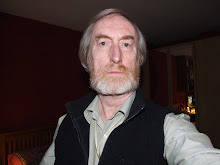A man has to have a haircut every so often. Not often enough that people will think him vain, but often enough to look like he cares. I was beginning to look like I didn't care.
There aren't many rural barber's shops left. There isn't one here. I asked about, and was told the ladies salons did the men as well. So off I sallied.
I had met the hairdresser later one night a few nights ago. Her husband was trying to persuade me to run away with him to a tractor factory. She was trying to persuade him that he would feel differently in the morning. (Actually, I got a distinct impression he was going to feel differently the second she got him out the door.)
So I now look like I care again. It's a good haircut. And it's much pleasanter to have your hair cut by a woman. Of course no-one will notice.
I decided I was going to show off my new appearance by lunching in town, in the young ladies restaurant. I don't normally eat lunch, since an American breakfast lasts me all day. I have to work up (do I mean "down"?) a lot of dutch courage to face an American-sized meal. They made no remarks about my appearance, but they did comment on my courage.
Later that night, I got a bit of a shock. The Grown-up Ladies Shuffleboard Team are still after me. There is a shuffleboard table here in good order, but it's not used very much. Clearly plans are afoot.
I overheard a young man talking. As I focused in on his conversation, it became clear he had been at the scene of the Grown-up ladies defeat, up near Fort Peck, Montana. And he had been there at the very time it happened.
I slipped away into the crowd before he turned round. He was clearly a resourceful young man: he had come here from Fort Peck by kayak, covering the ground in a mere 56 days. I checked the website he let slip, and he is equipped with a satellite phone. I had a lucky escape.
What gave him away was the meticulous cover story they had concocted. I will pass it on, just to let you see how well-crafted and plausible it sounds.
He claims he is a medical student from Virginia. His grandfather recently contracted Parkinson's Disease, and is responding very well to modern treatment.
He claims he is kayaking all the way from Three Forks (the start of the Missouri) to the Gulf (the end of the Mississippi) in order to raise awareness and funds for the National Parkinson Foundation. He has even set up a web site as a cover. It's at http://www.paddlingforparkinsons.com . Have a look at it. See what you think.
Me? I know the Grown-up Ladies are still after me.























